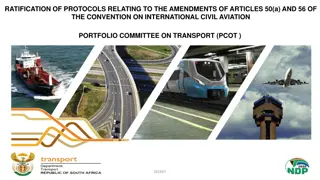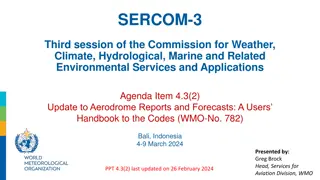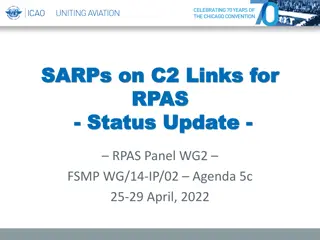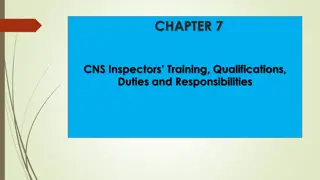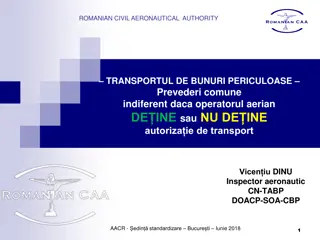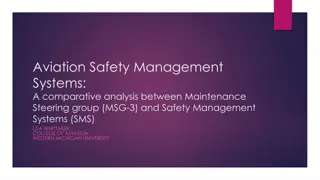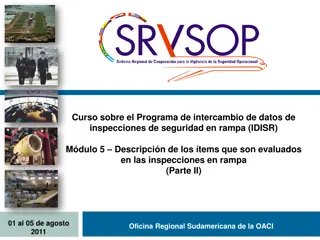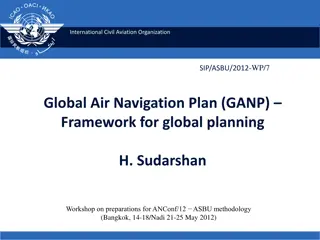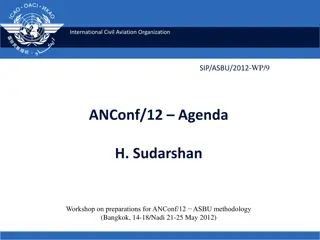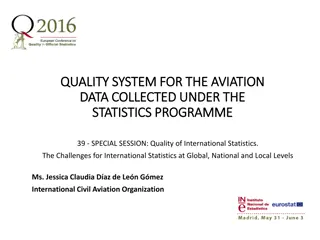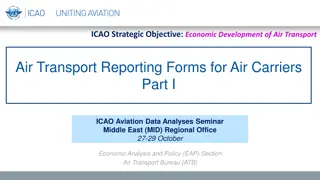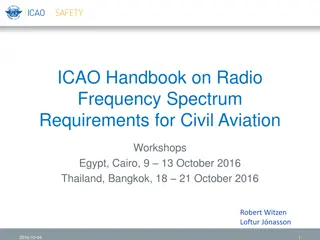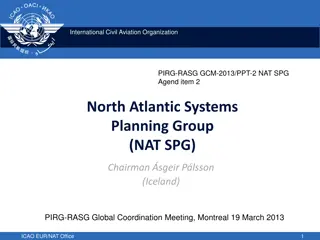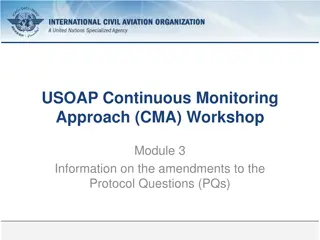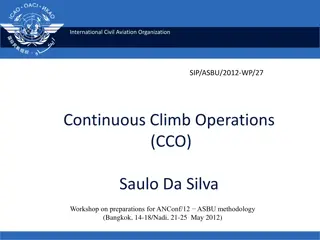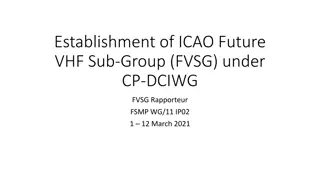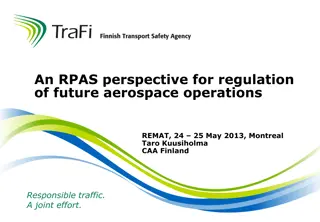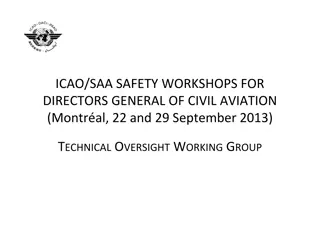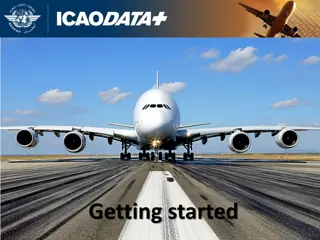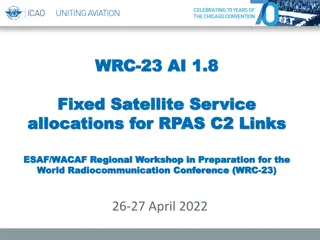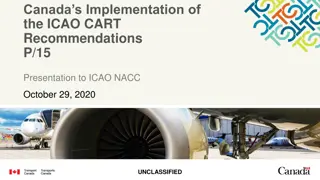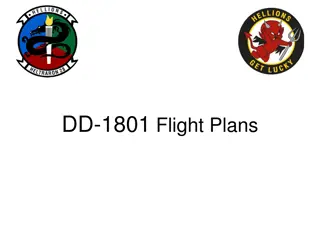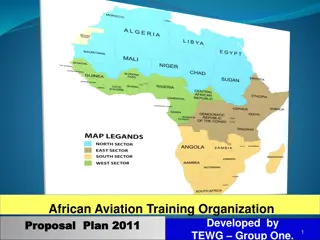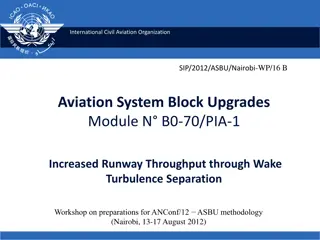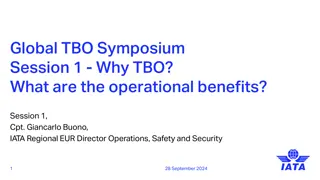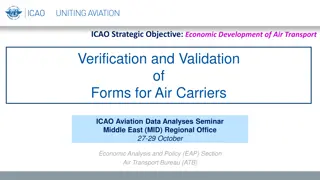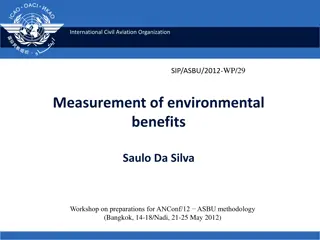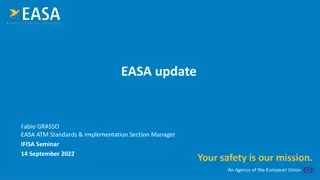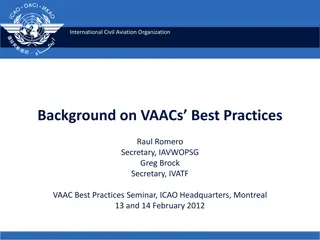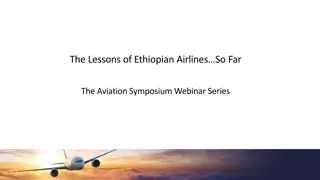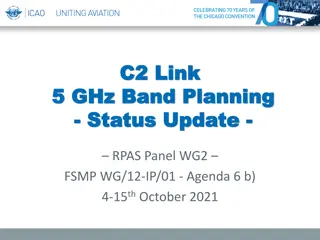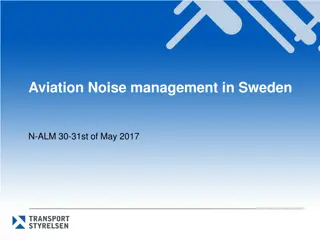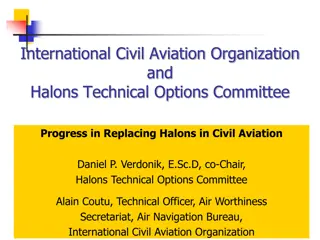South Sudan Civil Aviation Authority Overview
South Sudan Civil Aviation Authority (SSCAA) was established in 2012 to regulate the aviation industry in South Sudan. As a member of ICAO, SSCAA aims to provide efficient, safe, secure, reliable, and affordable aviation infrastructure and services. Challenges include financial autonomy and meeting
1 views • 10 slides
Ratification of Protocols Relating to Amendments of Articles 50(a) and 56 of the Convention on International Civil Aviation
South Africa, a Member State of ICAO, ratified the Chicago Convention and seeks support from PCOT for the amendments to Articles 50(a) and 56. The proposed changes aim to increase the size of the Council and the membership of the Air Navigation Commission to better represent the expanding membership
0 views • 11 slides
Understanding the Patient Safety Incident Response Framework (PSIRF)
The Patient Safety Incident Response Framework (PSIRF) is set to replace the Serious Incident Framework (2015) within the NHS, marking a significant shift in responding to patient safety incidents. Its key aims include compassionate engagement, system-based learning, proportionate responses, and sup
5 views • 9 slides
Revised Municipal Accreditation Framework 2023 Overview
The Revised Municipal Accreditation Framework 2023 presentation discusses the purpose, MINMEC resolutions, legislative framework, and recommendations related to enabling municipalities to administer national housing programs. It outlines the progressive process of capacitation through accreditation
1 views • 37 slides
Update to Aerodrome Reports and Forecasts: A Users Handbook to the Codes (WMO-No. 782) - SERCOM-3 Session
Presentation on the proposed 2025 update to the Aerodrome Reports and Forecasts handbook during the SERCOM-3 session in Bali. The update focuses on minor changes to aeronautical meteorological codes related to METAR and SPECI reports, aligning with ICAO Annex 3. The content includes background infor
0 views • 6 slides
Uncovering the Hidden Challenges in the Aviation Industry's Climate Change Story
The aviation sector's impact on global emissions, lack of media coverage, opaque decision-making at ICAO, COVID-19's effects on climate plans, green recovery challenges, and the concept of flight shaming are explored in this revealing analysis.
0 views • 11 slides
Development of C2 Link SARPs for RPAS Operations
The International Civil Aviation Organization (ICAO) is responsible for developing SARPs for C2 links in RPAS operations to ensure safe and efficient communication systems. These SARPs cover procedures and systems related to C2 links within RPAS, with ongoing efforts to standardize and enhance compa
0 views • 14 slides
CNS Inspectors Training and Responsibilities in Civil Aviation Safety Oversight
In this chapter, the focus is on the training, qualifications, duties, and responsibilities of CNS inspectors in civil aviation safety oversight. It covers the importance of education and training, ICAO guidance on training, and the role of Civil Aviation Safety Inspectors (CASI) as qualified indivi
0 views • 47 slides
Romanian Civil Aeronautical Authority Operation Manuals Overview
The Romanian Civil Aeronautical Authority's operation manuals cover regulations and procedures for the transport of dangerous goods, including general policies, limitations, classification, marking, and labeling. The manuals also address the conditions under which weapons, war munitions, and sportin
0 views • 30 slides
Overview of Framework-based Regents Examination in Global History and Geography II
The Framework-based Regents Examination in Global History and Geography II for Grade 10 is aligned with the NYS K-12 Social Studies Framework. It was first administered in June 2019, with Grade 10 students taking the exam. There was an overlap period from June 2019 to June 2020 with the Transition E
1 views • 14 slides
Lancashire Assessment and Planning Framework: Enhancing Child Welfare Through Comprehensive Assessments
The Lancashire Assessment and Planning Framework outlines the approach for assessing and managing child welfare cases in Lancashire. It emphasizes the importance of effective assessment, planning, and interventions to meet the needs of children and families. The framework integrates tools like the C
0 views • 13 slides
Comparative Analysis of Aviation Safety Management Systems: MSG-3 vs. SMS
The aviation industry continuously strives to enhance safety, leading to the development of Safety Management Systems (SMS) by ICAO and the longstanding Maintenance Steering Group (MSG-3) program. These systems focus on improving safety through different approaches, with MSG-3 emphasizing engineerin
1 views • 25 slides
Course on Safety Ramp Inspections: Items Evaluation - Part II
This course module covers the evaluation of various items during safety ramp inspections, focusing on cabin and safety aspects. It includes detailed instructions, references, seriousness levels, and images illustrating the inspection criteria for elements such as cabin cleanliness, crew seats and ha
0 views • 43 slides
Global Air Navigation Plan Framework Overview
The International Civil Aviation Organization (ICAO) is developing a revised Global Air Navigation Plan (GANP) to enhance global planning mechanisms. The plan includes strategic documents for regional and national air navigation infrastructure planning, with a focus on CNS/ATM systems and discipline
1 views • 19 slides
International Civil Aviation Organization Workshop Overview
The International Civil Aviation Organization (ICAO) held a workshop in 2012 to prepare for the ANConf/12 ASBU methodology. The workshop focused on the One Sky concept, emphasizing global planning and operational improvements in air traffic management. Topics included strategic issues, roadmap devel
0 views • 16 slides
Quality System for the Aviation Data in ICAO
International Civil Aviation Organization (ICAO) is responsible for collecting, analyzing, and disseminating statistics related to civil aviation. The quality system for aviation data ensures relevance, accuracy, timeliness, accessibility, comparability, and coherence of the collected data. ICAO's s
0 views • 7 slides
Air Transport Reporting Forms and Economic Development in Aviation
Explore the array of reporting forms essential for air carriers to track commercial operations and traffic data. The International Civil Aviation Organization (ICAO) emphasizes economic development in air transport through detailed analyses and policies presented in regional seminars. These forms co
0 views • 23 slides
ICAO Handbook on Radio Frequency Spectrum Requirements for Civil Aviation Workshops
This handbook provides insights into spectrum requirements for civil aviation workshops conducted in Egypt and Thailand in October 2016. It covers spectrum strategy, frequency management, spectrum overview for aviation, and frequency assignment planning to support the application of SARPs in Annex 1
0 views • 10 slides
Aerodrome Inspector's Handbook: Certification Course Overview
Explore an online certification course presented by COSCAP-SA focusing on aerodrome inspection and certification. The course covers topics like safety management systems, aerodrome physical characteristics, and ICAO provisions. It is designed for CAAs and aerodromes in Afghanistan, Bangladesh, India
0 views • 51 slides
Overview of North Atlantic Systems Planning Group (NAT SPG)
The North Atlantic Systems Planning Group (NAT SPG) is a collaborative forum comprising countries like Canada, Iceland, and the United States, along with various aviation organizations. Established in 1965 by the ICAO Council, NAT SPG focuses on enhancing air navigation systems in the region. Their
0 views • 8 slides
Overview of Amendments to USOAP Continuous Monitoring Approach (CMA) Protocol Questions
This module provides detailed information on the recent amendments to the Protocol Questions (PQs) in the USOAP Continuous Monitoring Approach (CMA). It covers the revision process, impact on the Legal Enforcement Instrument (LEI), changes in the PQ methodology, mapping between old and revised PQs,
0 views • 35 slides
Enhancing Aircraft Efficiency through Continuous Climb Operations (CCO)
The International Civil Aviation Organization (ICAO) conducted workshops on Continuous Climb Operations (CCO) to guide stakeholders like air navigation service providers, aircraft operators, airport operators, and aviation regulators. CCO involves optimizing the aircraft's vertical profile during cl
0 views • 23 slides
Establishment of ICAO Future VHF Sub-Group (FVSG) Summary
Advancements in satellite and communication technologies have paved the way for the establishment of the Future VHF Sub-Group (FVSG) under the Project Team Terrestrial (PT-T) of the Data Communications Infrastructure Working Group (DCIWG). The objective of FVSG is to develop provisions supporting gl
0 views • 6 slides
Regulation of Future Aerospace Operations from an RPAS Perspective
RPAS, or Remotely Piloted Aircraft Systems, present a wide range of shapes, sizes, and operations that require a comprehensive regulatory framework for safe integration into airspace. The ICAO framework plays a crucial role in addressing the challenges and opportunities associated with RPAS technolo
0 views • 8 slides
ICAO/SAA Safety Workshops for Directors General of Civil Aviation Overview
This overview emphasizes shaping the attitudes of Directors General towards safety oversight in civil aviation, highlighting their ultimate accountability and responsibilities in ensuring global aviation safety. It covers key topics such as safety concepts, state responsibilities, legal frameworks,
0 views • 21 slides
ICAO Data Portal Guide: Getting Started & Navigation Tips
Explore the step-by-step login process, terms and conditions agreement, selecting data modules, basic tools, and downloading data on the ICAO website. Learn how to navigate and use the main toolbar icons efficiently for managing data selections effectively.
0 views • 31 slides
Spectrum Allocations for RPAS C2 Links and ITU-R Resolution 155 Status Update
This content delves into the spectrum allocations for RPAS C2 links to facilitate safe operation in non-segregated airspace, covering the background, regulatory considerations, technical aspects, and updates from ITU-R Resolution 155. It highlights the identified frequency allocations for different
0 views • 24 slides
Canada's Implementation of ICAO CART Recommendations & COVID-19 Measures
Canada has diligently implemented ICAO CART Recommendations and Take-Off Guidance, including mandatory health checks, temperature screening, and mask-wearing for passengers and crew. The government and industry have collaborated on measures such as enhanced cleaning protocols, facility practices for
0 views • 5 slides
Understanding Changes to Flight Planning with DD-1801
The shift to DD-1801 from DD-175 in flight planning aligns with ICAO standards, simplifies formats, and allows for more detailed aircraft equipment information. Learn about the differences, filling out the form, and equipment capabilities required for DD-1801.
0 views • 15 slides
Proposal for the Creation of African Aviation Training Organization (AATO)
The proposal outlines the development of AATO, a continental body aimed at standardizing and harmonizing aviation training in Africa. Four Regional Aviation Training Boards will collaborate with ICAO to enhance accreditation and training quality across the continent, addressing common challenges fac
1 views • 23 slides
Enhanced Runway Throughput via Wake Turbulence Separation Module N.B0-70
This document discusses Module N.B0-70 of the ASBU methodology by ICAO, focusing on increased runway throughput through revised wake turbulence separation standards and procedures. The module addresses the need for more efficient spacing and sequencing of aircraft during approach and en-route operat
0 views • 12 slides
Benefits of Transitioning to Trajectory-Based Operations (TBO)
Explore the operational benefits of Trajectory-Based Operations (TBO) in modernizing the ATM system, endorsed by IATA as the core of ICAO's Global ATM Operational Concept. Learn about performance improvement opportunities and the long-term advantages of integrating TBO into aviation operations.
0 views • 4 slides
ICAO Strategic Objective: Economic Development of Air Transport Verification and Validation Overview
This content provides an in-depth analysis of the ICAO Strategic Objective focusing on the economic development of air transport through verification and validation processes for air carriers. It includes details on forms verification, economic analysis, and policy considerations discussed at the IC
0 views • 22 slides
ICAO SIP 2012 - ASBU Workshops Overview
The ICAO SIP 2012 - ASBU Workshops focused on operational improvements in global air navigation systems to address environmental concerns, including noise and emissions. Assembly resolutions outlined goals for fuel efficiency improvements and requested the development of tools for assessing benefits
0 views • 18 slides
EASA Update on Regulation 2020/469 and FIS/AFIS Requirements
EASA's update highlights the comprehensive set of requirements introduced by Regulation 2020/469 for Air Traffic Services (ATS) as of January 27, 2022. It emphasizes the alignment with ICAO provisions, transposition of SARPs and PANS for uniform application, and the certification of Flight Informati
0 views • 13 slides
International Civil Aviation Organization: Background on VAACs Best Practices
The International Civil Aviation Organization (ICAO) focused on harmonization and best practices related to Volcanic Ash Advisory Centers (VAACs) during a seminar in February 2012. Specific conclusions were drawn to improve the issuance of products and transfer of responsibilities between VAACs. The
0 views • 12 slides
The Lessons of Ethiopian Airlines: Aviation Symposium Insights
Exploring the lessons learned from Ethiopian Airlines accidents through a series of webinars in April 2019, this article discusses ongoing investigations, international aviation standards, and key timelines. Experts delve into the accidents involving Lion Air and Ethiopian Airlines, highlighting the
0 views • 21 slides
C2.Link 5GHz Band Planning Overview
The C2.Link 5GHz Band Planning involves allocation to AM(R)S, AMS(R)S, and ARNS on a co-primary basis, with ICAO systems and MLS given priority. RTCA MOPS for a terrestrial C2 Link system and EUROCAE MOPS for a geostationary satellite-based system were released. The use of TDD waveforms in RTCA DO-3
0 views • 13 slides
Aviation Noise Management Strategies in Sweden
Aviation noise management in Sweden focuses on a balanced approach with four principal elements: noise reduction at the source, adherence to ICAO noise standards, differentiated landing fees, and operating restrictions. Competent authorities such as the Swedish Environmental Protection Agency and Sw
1 views • 4 slides
Progress in Replacing Halons in Civil Aviation: ICAO Initiatives
In the journey to replace halons in civil aviation, the International Civil Aviation Organization (ICAO) has made significant strides with the Halons Technical Options Committee. Starting from the engagement in 2003 to the establishment of mandates in 2010, various decisions and agreements have shap
0 views • 9 slides

